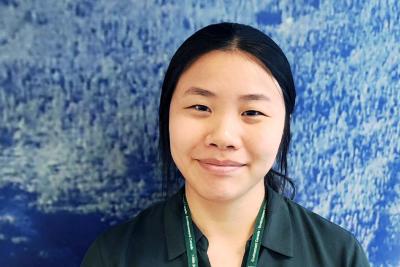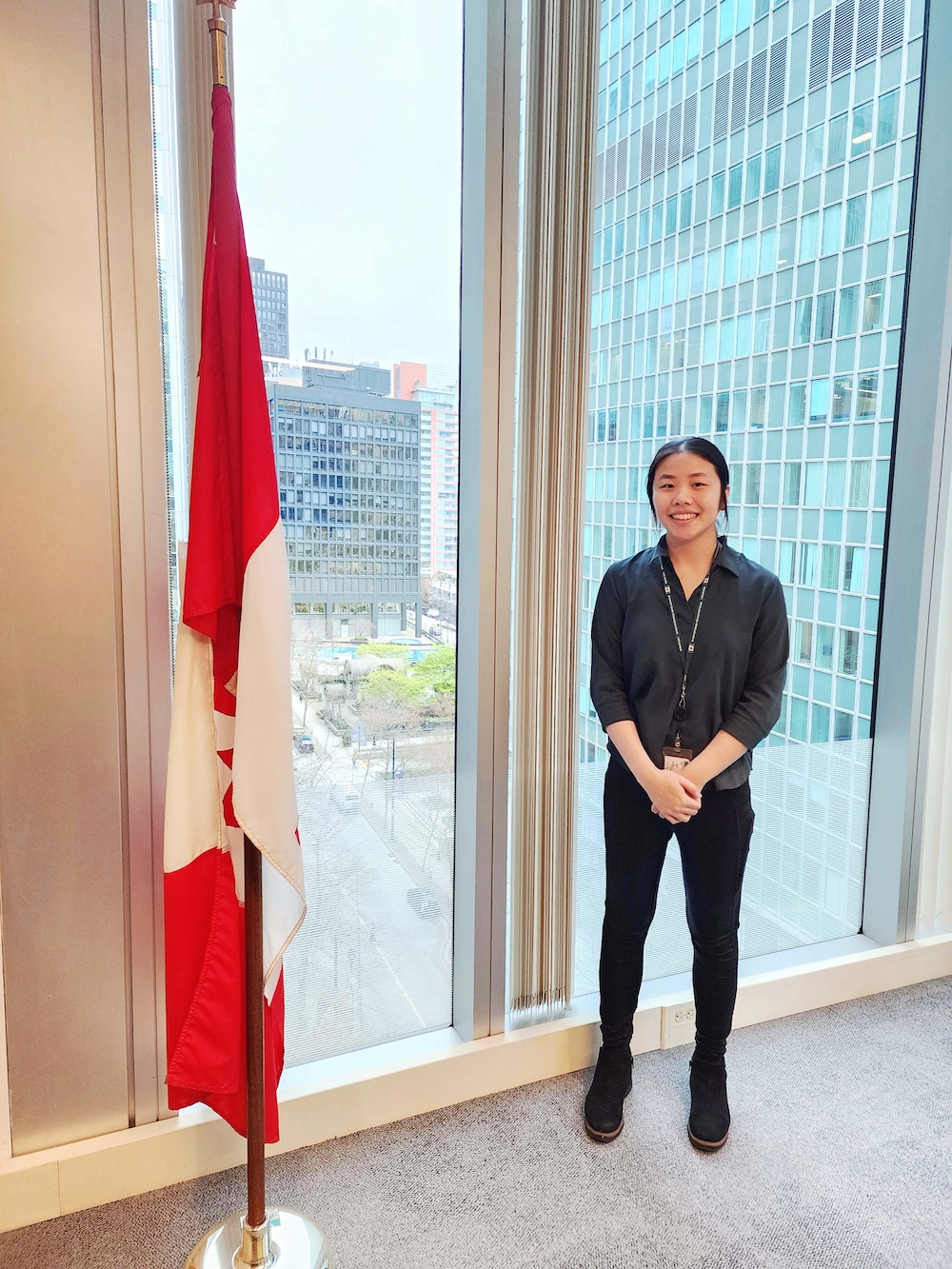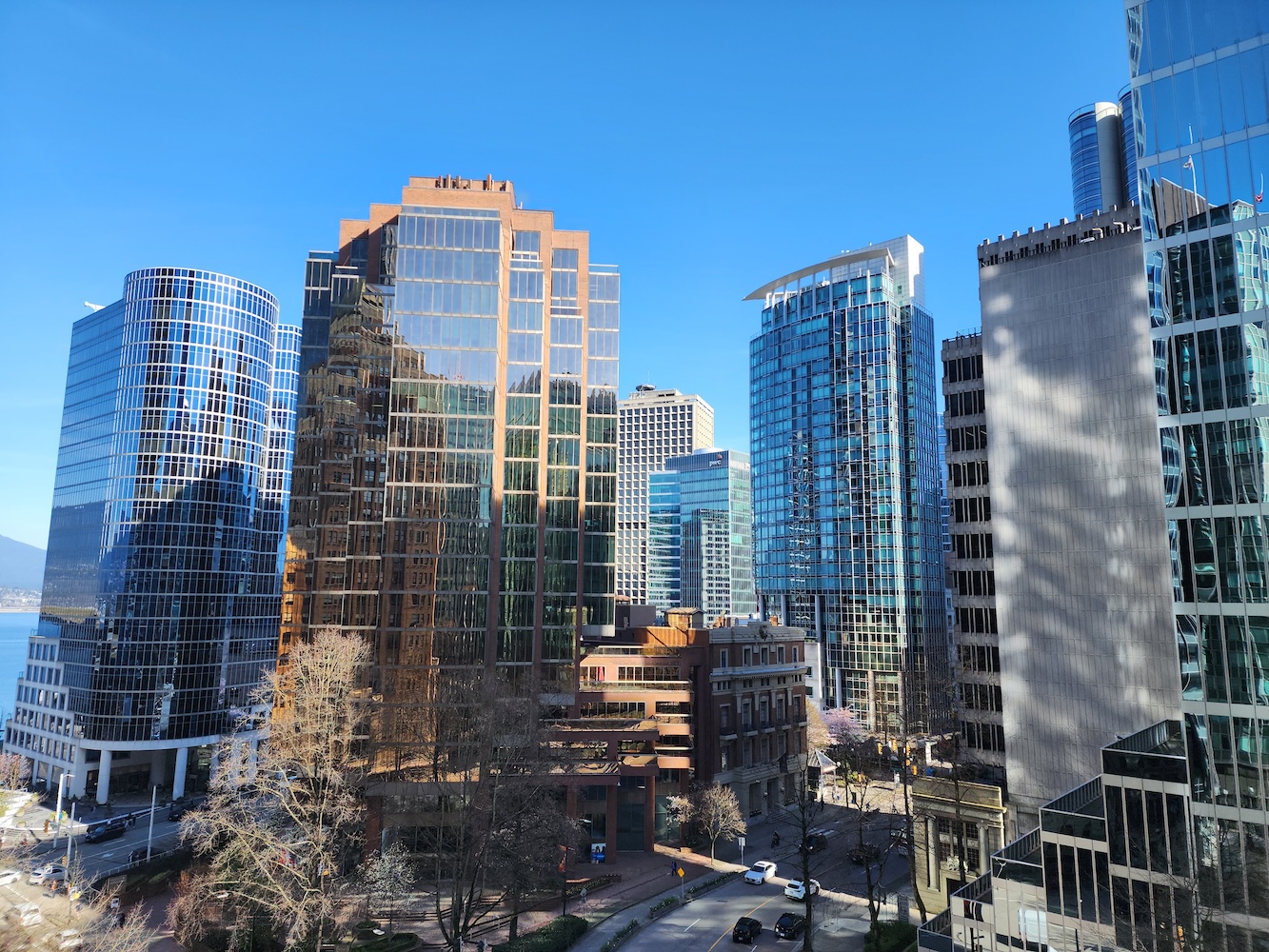Featured Student: Lilian Mah
July 9, 2024

July 9, 2024

I’m majoring in Geographical Sciences and expect to graduate in May 2026.
The main drawing point of Co-op was the opportunity to apply the skills that I learned during my studies and acquire work experience before I graduated.
I also wanted to explore the types of careers that my degree could potentially lead me to after graduation.
My first Co-op position was with Fisheries and Oceans Canada for 8 months as a part of its Marine Environmental Quality program.
For my second Co-op, I worked at Environment and Climate Change Canada with its Plastics Regulatory Affairs Division for 4 months. For my current and final Co-op term, I'm working for the Canadian Wildlife Service under Environment and Climate Change Canada as a part of its Habitat Assessment and Data Management unit in a GIS and data management role.
The Marine Environmental Quality program assesses and manages the impact of human activities on Canada’s marine environment, with underwater noise being the current stressor that the program is focusing on. The program is currently developing the Ocean Noise Strategy for Canada, which sets out Canada’s approach to addressing the impact of underwater noise on marine species and ecosystems. While the strategy applies to all of Canada, my team was tasked with supporting its development and future implementation in the Pacific region.
During my time with the team, I contributed to improving my team’s knowledge and understanding of underwater noise management throughout the Pacific region. For instance, throughout my placement, I collected information on ongoing and past underwater noise-related projects, research and initiatives from various groups and sectors in the Pacific, compiling the information into an accessible inventory with hundreds of entries. Another large part of my role was to summarize information on relevant projects into reports or briefings, such as the current status of various governmental and non-governmental group projects and their connections to underwater noise.
I learned that underwater noise is a complex issue to manage, because its sources and impacts involve many overlapping jurisdictions. For instance, shipping and construction of major projects are large sources of underwater noise in the region which is also home to many species at-risk. Therefore, coordination and collaboration with multiple parties is crucial. I got to attend many meetings and meet lots of people from other Fisheries and Oceans Canada teams, other governmental departments, environmental non-governmental groups and academic groups.
Overall, the purpose behind the work my team and I did aided the development of the Ocean Noise Strategy! My time working with the team has helped me understand and appreciate the work that goes into federal initiatives and projects.
My work focused on investigating the use of recycled content in plastic packaging. One of my projects analyzed data my team received from Health Canada regarding Letters of No Objections (LONOs) issued to manufacturers using recycled content in food packaging.
LONOs are requested by manufacturers on a voluntary basis to provide assurance to customers that their products have been evaluated and approved from a chemical safety standpoint. During my analysis, I investigated different variables, such as source materials and end use type, amongst LONOs to better understand which variables determine the amount of recycled content in the finished product.
Afterwards, I also analyzed the US Food and Drug Administration’s LONOs to compare the trends among their letters with Health Canada’s. It was definitely very interesting to see the different types of food-grade products that could be recycled and turned into new food packaging! It was also really interesting to see the range of possible products that could be made from one source material.
Other types of work that I did during my term include analyzing recycled content commitments set by various companies, putting together guidance material to help the public understand regulations and creating a catalogue that details various products incorporating recycled content by various companies. I found all of these projects to be really interesting because I could see the impact that they would have on the daily lives of many individuals.
For instance, I worked with data from companies that I've personally purchased from and whose products I've used. I also got to see how regulations affect the types of plastic products that occur in our daily lives that we may not pay much attention to, but play a large role in plastic waste.
As a result, I’ve grown a deeper understanding of the challenges surrounding plastic waste management and appreciation for the work that many groups are doing to address these issues.

During the last two months of my placement with Fisheries and Oceans Canada, my supervisor helped me reach out to people from various teams across the department, to learn about what they did after their undergraduate studies.
I was able to interview several people about the steps that they took to get to their current position, such as their time in academia, prior workplaces and their journeys through the federal government.
Everyone gave me lots of insight into what skills I should develop if I want to go into certain fields, what graduate studies for them was like and how they got previous and current jobs. It was amazing to meet so many people and ask the burning questions I had, especially since I'm approaching my own graduation. I'm very thankful my supervisor and manager suggested that I conduct these interviews before the end of my placement.
Compared to the start of my Co-op, where I mostly provided support on projects led by my coworkers, I'm now taking more on more leadership roles.
For instance, a lot of my work at the beginning of my Co-op journey involved reviewing documents and deliverables that either my team received or that my coworkers wrote. Learning how to edit was really beneficial, because it taught me how to think about word choice and sentence structure, as well as how they affect the message that I want to convey. It also helped to ease the transition when I started writing my own reports and collaborating with my coworkers on projects. Looking back, I’m proud of where I’ve progressed to in my ability to take on new projects and hope to continue developing, technical skills and personally, in my next work term.
When I first started my Co-op position with Fisheries and Oceans Canada, I struggled a lot with taking meeting notes as my only comparable experience was taking notes during lectures. I felt really overwhelmed and didn’t know what to write down as people were talking about information that I had never heard of before at a fast pace.
I asked my supervisor for advice and he told me to write down the main ideas being discussed and, if I feel overwhelmed, write down word-for-word what people said and revise the notes after. While this did improve my note-taking skills, I still found that I was struggling to take notes due to my unfamiliarity with frequently referenced information like acronyms, people’s names, and previous projects. I knew that I would continue to be overwhelmed unless I had context for these things, so I asked my supervisor if he could help me create a list of people that were frequently mentioned in team conversations and their connection to our team’s work. We also came up with a list of acronyms as well as ongoing and prior work that is constantly referenced. Lastly, I asked my supervisor if I could sit in on meetings he was attending to practice my note-taking skills.
Identifying the areas I was lacking in, coming up with potential solutions, and taking the initiative to implement those solutions helped me overcome my struggles. Now, I no longer feel overwhelmed when taking notes for meetings and the note-taking skills I developed in my previous position have really helped me in my current Co-op, where I consistently take meeting notes on behalf of my team.
My Co-op placements have greatly developed both my oral and written communication skills, as well as my ability to express my ideas at a professional standard. Seeing how various teams are tackling multifaceted problems taught me how to look at a problem from various perspectives to come up with an appropriate solution. In my current Co-op position, I’m learning new ways to improve my GIS and data analysis skills each day through different projects and assignments as well as support from my colleagues.
Co-op has definitely helped me improve many of my skills as well as transformed my mindset for approaching work. I’ve noticed that I feel much more confident about taking on tasks than I was prior to starting Co-op. Overall, I'm very grateful for the numerous interactions that I’ve had with people during my placements, as it helped me improve both my hard and soft skills, as well as gain insight into possible paths after graduation.
The Science Co-op program allowed me to explore potential industries and fields that my degree could lead me to, as well as how different workplaces operate.
While I've done all my Co-ops with the Government of Canada, I’ve gotten to experience different forms of work such policy, engagement and data analysis. I’ve also been exposed to different team structures, such as teams with members all across Canada, as compared to all being in the same office together.
Before Co-op, I didn’t really know what kind of work I could be doing, besides research. After the Co-op experiences that I've had so far, I found out about which aspects of work that I enjoy and I'm considering returning to the public service after graduation.

The resume and cover letter workshops were definitely the most valuable resource from the Co-op program. While there are lots of great resources on other websites and platforms for how to format these documents and what to include, I found that a vast majority of the advice out there is aimed at people who have already graduated and have work experience. Trying to build a resume and cover letter as a student whose only experience in their field of study thus far is through courses and labs can be incredibly difficult and discouraging when you’re constantly referencing resources that expect you to already have a degree and relevant work experience.
The workshops provided by the Co-op program were by far the most comprehensive resource that I've seen for how to demonstrate your skills to employers as a current student, helping you to leverage the skills that you’ve learned through coursework and non-relevant work experience in place of previous experience in the field. The workshops that I attended at the start of the Co-op program completely transformed my approach to writing resumes and cover letters, allowing me to have confidence in my abilities as a student, despite my limited work experience at the time.
I really believe that every interview and job offer, especially my first one, that I had during my time in the Co-op program wouldn't be possible if it wasn’t for the direction that my Coordinator provided during the workshops.
When you start looking for jobs, keep an open mind to all types of positions!
One of the best things about Co-op, is the opportunity to try out different fields and discover which career options that you like. There are a wide variety of jobs that your degree could lead you to, as well as many positions which could seemingly be unrelated to your field of study, but you may excel at due to transferable skills. You’ll find that each new position is an opportunity to learn and improve upon your abilities.
It’s also perfectly normal to not know how to do everything when you start your work term!
It’s easy to feel discouraged when you’re surrounded by colleagues with established careers, who have been at their jobs for years, but it’s important to recognize that your employer hired you because they believe you have what it takes to excel in the position. Co-op is a time to help you develop new skills and improve upon existing ones, so coming in with a positive mindset and openness to learn as much as you can are the most valuable traits to have. My supervisor and coworkers were always appreciative of me asking questions and taking the initiative to tackle new challenges, both of which are excellent ways to further your growth as an individual.
At the moment, I would like to return to working for the Government of Canada after graduation, but overall, I want to continue exploring the different the career paths that my degree could lead to.
We honour xwməθkwəy̓ əm (Musqueam) on whose ancestral, unceded territory UBC Vancouver is situated. UBC Science is committed to building meaningful relationships with Indigenous peoples so we can advance Reconciliation and ensure traditional ways of knowing enrich our teaching and research.
Learn more: Musqueam First Nation